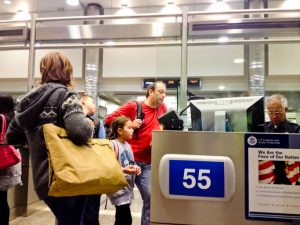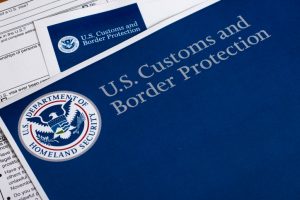
No less than 24,511 U.S. Customs and Border Protection (CBP) officers with the Office of Field Operations protect our nation’s 300-plus ports of entry by enforcing customs, immigration, and agricultural laws and regulations. Armed with the highest qualifications and the ability to meet the strictest training standards, along with unwavering vigilance and a steadfast commitment to protecting the U.S. from terrorism and stopping crime, CBP officers are responsible for screening all foreign visitors, returning U.S. citizens, and imported cargo making its way into the country.
It’s a fast-paced, action-packed career that’s focused on securing the border, preventing drug smuggling, enforcing immigration laws, protecting agriculture, and ensuring the uninterrupted flow of legal trade.
If you want to become part of this elite group of men and women, buckle up—it’s a career path that won’t let you down in terms of challenges, excitement, and opportunities to serve as a fierce defender and protector of the American people.
Keep reading to learn more about how to become part of the CBP and what you’ll earn as a CBP officer:
Factors Influencing Salaries for CBP Officers: Locality, Premium Pay and Incentives
Career Progression and Salary Schedule for CBP Officers
Starting Salaries for CBP Officers at Different GS Levels Align with Experience and Other Qualifications

Customs and Border Protection officers earn salaries according to the federal government’s General Schedule (GS) pay scale, with new hires starting at the GS-5, GS-7, or GS-9 level depending on previous job experience and education.
There are ten steps within each pay level, revealing the following salary ranges, as of 2020:
- GS-5: $30,113 – $39,149
- GS-7: $37,301 – $48,488
- GS-9: $45,627 – $59,316
GS-5 Level
There are three ways in which you can qualify at the GS-5 level: (1) work experience; (2) education; or (3) a combination of education and experience.
- To qualify through experience, you must show proof of at least three years of full-time general work experience, one year of which must be comparable to the GS-4 federal level. You may also meet the experience requirement if you can show proof of volunteer experience through national service programs or other organizations.
- To qualify through education, you must show proof of the completion of a four-year course of study in any field leading to a bachelor’s degree.
- You may also qualify through a combination of education and experience.
GS-7 Level
There are four ways in which you can qualify at the GS-7 level: (1) specialized experience; (2) graduate education; (3) a combination of specialized experience and education; or (4) superior academic achievement.
- To qualify through specialized experience, you must show proof of at least one year of specialized experience comparable to the GS-5 level; experience must include compliance/regulatory experience and extensive work at borders, seaports, airports, or other ports of entry and/or work involving preliminary screening of persons for entry and immigration status.
- To qualify through graduate education, you must have completed one year of graduate-level education beyond a bachelor’s degree in a field like criminology, criminal justice, homeland security, justice studies, law enforcement, courts and judicial systems, forensic technology, forensic psychology, corrections, or rehabilitation.
- To qualify through superior academic achievement, you must have completed a bachelor’s degree with one of the following: 3.0 minimum cumulative GPA; a standing in the upper third of your graduating class; or membership in a national scholastic honor society.
- You may qualify through a combination of graduate education and specialized experience.
GS-9 Level
There are three ways in which you can qualify at the GS-9 level: (1) specialized experience; (2) graduate education; or (3) a combination of education and experience.
- To qualify through specialized experience, you must show proof of at least one year of specialized experience comparable to the GS-7 level, which must include extensive duties in importing and exporting merchandise or in the admission of travelers.
- To qualify through graduate education, you must show proof of the completion of at least two years of graduate education beyond a bachelor’s degree in an area like criminology, criminal justice, homeland security, justice studies, law enforcement, courts and judicial systems, forensic technology, forensic psychology, corrections, or rehabilitation.
- You may qualify through a combination of graduate education and specialized experience.
Factors Influencing Salaries for CBP Officers: Locality, Premium Pay and Incentives

Your base salary doesn’t begin to represent your total earning power as a CBP officer. In fact, there are several factors that can significantly increase your pay here:
Locality Pay
While the GS schedule provides a base salary for CBP officers, many earn higher salaries in parts of the country where the cost of living is higher than the national average. Check out the locality pay tables here.
For example, if you’re hired at the GS-5 level to work as a CBP officer in the Miami-Fort Lauderdale metro area, you’ll earn a salary of between $37,193 – $48,353 – or about $4,000-$5,000 more annually than the GS-5 schedule salary.
Incentive Pay
In addition to locality pay, CBP offers additional “incentive pay” for CBP officers (during their first three years of employment) working in the following locations:
- Douglas, Lukeville, Nogales and San Luis, AZ
- San Francisco and Calexico, CA
- Coburn Gore and Jackman, ME
- Grand Portage, MN
- Raymond and Sweetgrass, MT
- Pembina and Portal, ND
- Presidio, TX
- Oroville, WA
Overtime and Premium Pay
Overtime also plays a big part if your overall earning potential as a CBP officer. In fact, according to the CBP, a fully trained CBP officer can earn up to $45,000 annually in overtime pay alone.
And if you work Sunday, holiday, or night shifts, you’ll earn premium pay. Cash awards are also often paid out to CBP officers in recognition of their superior efforts.
The CBP highlights how premium pay, overtime pay, and locality pay can add significantly to your overall earning potential as a CBP officer. The CBP provides the average total compensation for CBP officers at different pay levels, as of 2020:
- GS-5
- Base salary: $30,113
- Average locality, overtime, and night differential: $15,591
- Average total compensation: $45,704
- GS-7
- Base salary: $37,301
- Average locality, overtime, and night differential: $21,163
- Average total compensation: $61,311
- GS-9
- Base salary: $45,627
- Average locality, overtime, and night differential: $29,751
- Average total compensation: $76,242
- GS-11
- Base salary: $55,204
- Average locality, overtime, and night differential: $40,509
- Average total compensation: $98,388
- GS-12
- Base salary: $66,167
- Average locality, overtime, and night differential: $42,532
- Average total compensation: $108,699
Career Progression and Salary Schedule for CBP Officers

The period during which you’re paid a starting salary as a CBP officer won’t last long, as you’ll be eligible for a promotion to the next higher grade level after you successfully complete one year at your current grade level. So, if you’re hired as a CBP Officer at the GS-5 level in January 2021, you’ll enjoy a bump in pay to the GS-7 level in January 2022, and so on until you reach the GS-11 level.
Beyond that you’ll be eligible for competitive promotions to supervisory positions in the GS-13/14/15 range and to executive (senior executive service) levels thereafter.
- Entry Level: GS-5/7/9
- Journeyman: GS-11/12
- Supervisory: GS-13/14/15
- Executive (Senior Executive Service) GS-15+
As a CBP officer, you may have the opportunity to increase your salary while challenging yourself by:
- Working internationally
- Conducting K-9 inspections
- Joining the Special Response Team – the tactical and special response arm of the Office of Field of Operations
- Joining the Anti-Terrorism Contraband Enforcement Team (A-TCET) – a specialized unit of the Office of Field Operations that seizes drugs, weapons, currency, and illicit contraband
You may also become one of the CBP’s 2,465 agriculture specialists, who prevent the introduction of harmful plant species, animal diseases, and agricultural bioterrorism into the country.
To qualify for this position, you must have a bachelor’s degree from an accredited college or university in a field in the biological sciences, such as botany, biology, agriculture, crop science, ecology, pest management, plant science, etc.
Similar to CBP officers, agricultural specialists are hired at the GS-5/7/9 level and qualify for significant overtime pay, premium pay, and locality pay.
Salary and employment data compiled by the U.S. Customs and Border Protection. Figures represent accumulated data for all employment sectors in which CBP officers work.
All salary and employment data accessed September 2020.


